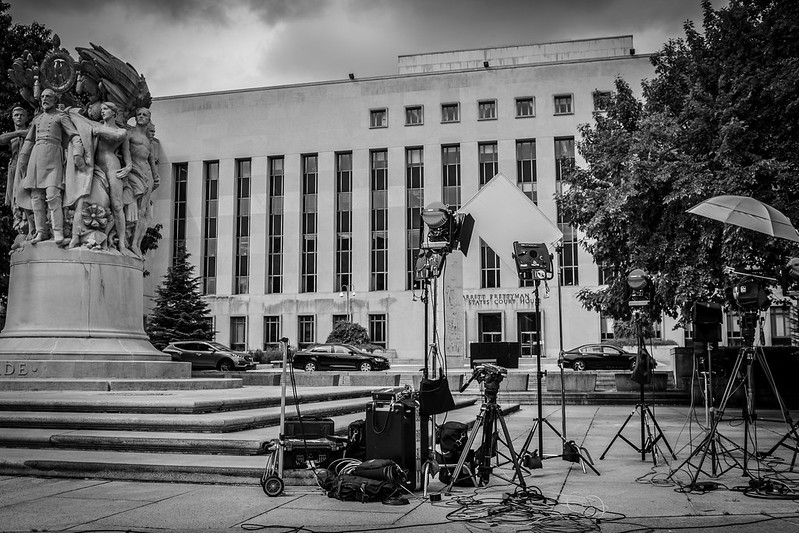Judge Sullivan Can Reject the Government’s Motion to Drop Flynn’s Case
If, after careful review, the judge finds that the government’s motion to dismiss the case against Michael Flynn is tainted, he has a duty to deny that motion.

Published by The Lawfare Institute
in Cooperation With

In the wake of Attorney General William Barr’s unprecedented decision to drop the Department of Justice’s years-long prosecution of former Trump national security adviser Michael Flynn, many observers are asking: Is this the end of the case? Two recent orders issued by Judge Emmet Sullivan, who is presiding over Flynn’s prosecution, make clear the answer is no.
First, exercising the court’s inherent authority, Sullivan indicated on May 12 that he will welcome amicus curiae briefs from anyone who may have a “perspective that can help the court beyond” what “the parties are able to provide,” given that both Flynn and the government are now seeking the same outcome. Then, the next day, Sullivan appointed an independent lawyer—former federal prosecutor and U.S. district court judge John Gleeson—to advise him as to whether he should grant the department’s request to dismiss the case. (Prior to Sullivan’s order, Gleeson co-authored a Washington Post op-ed arguing that the court should carefully review the government’s motion.)
Some commentators have questioned whether Sullivan has the authority to deny the government’s motion. In the immediate aftermath of the Justice Department’s motion, the early conventional wisdom—including on Lawfare—seemed to be that precedent allowed the judge virtually no leeway. Since then, some scholars, including Noah Feldman and Laurence Tribe, have countered the claim that Sullivan’s role is to be a potted plant. But to our knowledge, no one has offered a detailed analysis of the legal issues that Sullivan now confronts.
Two of us, along with colleagues at Protect Democracy, represent more than 960 former federal prosecutors and former high-ranking Justice Department officials (the number continues to grow). On their behalf, we plan to seek leave to file an amicus brief in the Flynn case—a current draft of which readers can find here—once a briefing schedule is set.
Our conclusion is clear: Sullivan does not merely have the authority to review the department’s motion to dismiss. As courts have described it, he has a “duty” to ensure that the dismissal is in “the public interest” and is not “tainted by impropriety” or “bad faith.” And if, after careful review, he finds that the motion is in fact tainted, his duty is equally clear: He must deny it.
Given the unique circumstances of this case—including the nature of Flynn’s actions, the Justice Department’s remarkable reversal, and the facially implausible arguments the department has offered to support that reversal—Sullivan’s obligation to conduct a thorough inquiry into the government’s decision is of the utmost importance. Assisted by Gleeson, he should conduct an evidentiary hearing into the circumstances surrounding the government’s change of heart. And if that hearing confirms what the already available public record seems to show, Sullivan should reject the government’s motion and proceed to exercise the judiciary’s core task at the end of every criminal case in which the defendant has already pleaded guilty: imposing a sentence.
Rule 48(a) Requires Judges to Reject a Dismissal That Is Not “in the Public Interest”
Historically, prosecutors had unfettered authority to dismiss criminal charges on their own initiative, at any time and for any reason, or for no reason at all. But that changed in late 1944, when the Supreme Court adopted Federal Rule of Criminal Procedure 48. The modern rule, which has remained virtually the same since its inception, states that “[t]he government may, with leave of court, dismiss an indictment, information, or complaint” (emphasis added).
This language expressly envisions a role for the court. It is most commonly associated with the doctrine of prosecutorial harassment, which protects defendants from abuse by preventing the government from manipulating the timing of a case or forum shopping—that is, moving a case from court to court—by “charging, dismissing, and recharging” a case. But that is not the only evil Rule 48 addresses. As Thomas Frampton explained recently in the most thorough scholarly treatment of the rule’s history to date, Rule 48’s principal object was not to protect “individual defendants, but rather to guard against dubious dismissals of criminal cases that would benefit powerful and well-connected defendants.” In other words, Frampton writes, Rule 48 “was drafted and enacted precisely to deal with the situation that has arisen in United States v. Flynn.”
Frampton’s conclusion is supported by the history of Rule 48’s adoption. When the rule was first submitted to the Supreme Court for approval, it codified the prosecutor’s unchecked common law power to dismiss a case. But the Supreme Court sent that proposed draft back to the drafting committee, with a citation to the high court’s own recent opinion in Young v. United States. In that case, the court declared that the judiciary—in conjunction with the executive branch—assumes a special role in ensuring that the criminal law is administered justly. The court wrote:
The public interest that a result be reached which promotes a well-ordered society is foremost in every criminal proceeding. That interest is entrusted to our consideration and protection as well as that of the enforcing officers. ... [T]he proper administration of the criminal law cannot be left merely to the stipulation of parties. (Emphases added.)
Subsequently, the Supreme Court inserted the phrase “by leave of court” when it issued the final version of Rule 48. As one of the leading decisions interpreting Rule 48 observes, this drafting history makes it “manifestly clear that the Supreme Court intended to clothe the federal courts with a discretion broad enough to protect the public interest in the fair administration of criminal justice.”
Of course, prosecutors’ motions to dismiss pending criminal charges can and often do serve laudable ends, including the protection of criminal defendants from flimsy charges or from punishments that may be unjust or too severe. In recognition of that fact—and of long-standing separation of powers principles—courts have held that the government’s prosecutorial discretion to dismiss a case is necessarily broad and should be disturbed only in rare circumstances. But as the U.S. Court of Appeals for the D.C. Circuit pointedly observed in its seminal decision in United States v. Ammidown, a judge reviewing a prosecutor’s motion to dismiss should not “serve merely as a rubber stamp for the prosecutor’s decision.” Rather, “when the defendant concurs in the dismissal[,]” the trial judge retains the “responsibility” to determine whether the proposed dismissal “adequately protects the public interest,” and to refuse the prosecutor’s request if it does not.
Ammidown remains the touchstone opinion interpreting the scope of trial courts’ authority under Rule 48. The Supreme Court has cited Ammidown with approval in its own case law interpreting Rule 48, and Judge Sullivan himself cited Ammidown as his circuit’s primary Rule 48 precedent in a 2019 opinion resolving a prosecutorial-harassment claim. The D.C. Circuit also continues to treat Ammidown as the circuit’s seminal Rule 48 opinion—including in a more recent opinion, United States v. Fokker Services.
Some commentators have read Fokker as effectively wiping out Sullivan’s authority to deny the government’s request in Flynn’s case, given that opinion’s sweeping assertion that “decisions to dismiss pending criminal charges ... lie squarely within the ken of prosecutorial discretion,” leaving no “substantial role for courts.” But it would be a mistake to overread this passage. Fokker concerned a trial court’s authority under the Speedy Trial Act to interfere with a proposed deferred prosecution agreement, essentially a form of pretrial probation in which a case is put on hold for a year or more while the prosecutor monitors the defendant’s behavior. No Rule 48 motion was filed in that case, which means the court of appeals had no occasion to revisit or alter its governing opinion in Ammidown.
More importantly, what Fokker Services says about Rule 48—read in its proper context—actually supports the proposition that Sullivan has the authority to review the government’s request in Flynn’s case. Indeed, the Fokker Services court drew a sharp distinction between cases in a pretrial posture—like all deferred prosecution agreements—and cases like Flynn’s in which a defendant has pleaded guilty and the court is called upon to impose a sentence. In drawing this distinction, the Fokker Services court repeatedly cited Ammidown with approval, reaffirming that opinion’s primary place in the doctrinal framework. And as Ammidown makes clear, a trial court in Sullivan’s position “should not be content with a mere conclusory statement by the prosecutor that dismissal is in the public interest.” Rather, as the Supreme Court later explained in its own leading case on the subject, the trial court must conduct an “examination of the record” in order to ensure that the government’s “efforts to terminate the prosecution [are not] tainted with impropriety.”
Appellate case law interpreting this standard is sparse, presumably because the overwhelming majority of prosecutorial requests to drop cases are not tainted with impropriety. But while there do not appear to be cases in which appellate courts have prevented the Justice Department from dropping cases for reasons other than prosecutorial harassment—and while appellate courts have sometimes overruled district courts for rejecting prosecutors’ Rule 48 motions—the courts have consistently held that trial judges have a responsibility to consider whether a dismissal motion fails to “serve due and legitimate prosecutorial interests,” represents a marked “departure from sound prosecutorial principle,” is based on “a sham or a deception,” is “tainted by bad faith,” or is driven by base personal interests. The courts of appeals, in other words, have gone out of their way to insist that trial court judges not only can but should be vigilant against extreme cases of prosecutorial abuse—and have thus always held out the possibility of a case so extreme that denying a motion to dismiss would be necessary. This is that case.
The Need for Independent Review in Flynn’s Case
Flynn’s case is not a typical prosecution. The president’s former national security adviser stands accused of lying to the FBI, in the White House, about conversations he had with a hostile foreign power that had just interfered in the presidential election. This is a crime, and a serious one at that. And Flynn acknowledges as much. Indeed, he has already pleaded guilty not once but twice—on Dec. 1, 2017, and then again on Dec. 18, 2018—to a felony offense for his lies to the FBI. Against this backdrop, three distinct features of this case underscore the importance of Sullivan’s scrutinizing the government’s motion with the utmost care.
First, there is the case’s unique posture. Typically, when the government moves to drop a case, it does so before trial. And in that setting it deserves substantial deference. After all, as the Supreme Court has observed, before trial the government’s “assessment of the proper extent of prosecution may not have crystallized” and the government may still be assessing nuanced considerations such as the case’s “general deterrence value [or] the government’s enforcement priorities.” Moreover, as courts have recognized, it is hard to imagine how exactly a court might try to “compel the government to proceed” in a pretrial posture, as a judge is hardly going to dictate a prosecutor’s opening statement or order her to call a witness.
But in the Flynn case, the court need not “compel the government” to do anything at all, because the government has already done everything a prosecutor can do in a criminal case. It has already secured Flynn’s guilty plea–twice. It has also already prepared and submitted its sentencing memorandum (two of them, actually). And it has already told Sullivan in open court the sentence that it thinks is appropriate, at Flynn’s initial sentencing hearing back in December 2018.
The government, in other words, has reached the end of the road. The only thing left to do in this case is the “imposition of sentence,” which, as the Ammidown court observed, “is a matter for discretion of the trial judge.” In this posture, the real separation of powers threat is thus not that the judge will intrude on the prosecutor’s domain but, rather, that dropping the case would be “an intrusion on the judicial function,” given (to quote Fokker) “the Judiciary’s traditional power over criminal sentencing.”
Second, even more unusual than the case’s posture is the near obsessive attention it has received from the president of the United States, which undercuts any argument that the court might somehow encroach on the executive’s authority by reviewing or rejecting the government’s motion. After all, “a judge could not possibly win a confrontation with the executive branch over its refusal to prosecute, since the President has plenary power to pardon a federal offender.” The very real possibility of clemency for Flynn remains available here no matter how Sullivan rules on the department’s current request.
In fact, the only difference between such a pardon and the department’s motion to dismiss Flynn’s case is that the motion seeks, and requires, the court’s blessing. But that in itself raises a third concern: “the need to preserve the integrity of the courts.”
That concern is particularly acute in this case. For one thing, lying to federal investigators is a serious crime that strikes “at the very trunk nerve of our system of administering justice,” especially when the lie is to FBI agents in the course of a vital national security investigation. Granting the government’s motion would put the court’s imprimatur on the claim that Flynn should not be punished for such egregious behavior. And that imprimatur would be all the more salient here, given Sullivan’s widely covered remarks at Flynn’s initial sentencing hearing that he was “not hiding [his] disgust, [his] disdain for this criminal offense.”
The Government’s Faulty Motion
Based on what we currently know, the government’s attempt to dismiss the Flynn prosecution appears to fall squarely within the narrow category of circumstances in which a judge not only can but should deny a Rule 48 motion. The government’s characterization of the facts and governing law are so distorted as to strongly suggest that they are a pretext for improper political considerations, which in turn would mean that the government’s motion is “tainted by impropriety,” is not in the “public interest," and thus should be denied.
The government’s reasoning boils down to this: When the FBI interviewed Flynn, the government says, it had already decided that it was going to close a counterintelligence investigation that it had opened to examine Flynn’s potential role in Russia’s interference in the 2016 election. Moreover, while the point of the FBI interview was to ask Flynn about his phone call with the Russian ambassador in the weeks leading up to the president’s inauguration, the FBI had already concluded, based on its transcript of the call, that it likely would not pursue criminal charges based on the call itself. From these two premises, the government lands at its novel legal conclusion: Flynn’s concededly false statements to the FBI—in which he lied about the substance of his communications with the Russian ambassador—were not “material” within the meaning of 18 U.S.C. § 1001, the statute under which Flynn was charged, because the FBI did not have a “legitimate” criminal investigation of Flynn pending at the time it interviewed him.
Of course, there is a rather obvious problem with this assertion: Flynn pleaded guilty to the government’s charge. But even putting that aside, the government’s newly minted claim—reversing the position it maintained over the two-and-a-half-year lifespan of this case—is transparently baseless as a matter of both law and fact.
As to the law, the Supreme Court has confirmed that § 1001 is “sweeping” in its scope. It makes it a crime to lie to a federal investigator about “any matter within the jurisdiction of the executive, legislative, or judicial branch of the Government of the United States,” including the FBI. Indeed, the statute’s already-broad scope is even broader when it dovetails with the FBI’s own broad and dual-purpose jurisdiction to investigate not only potential violations of federal criminal law but also threats to national security that may or may not be criminal in nature. As the D.C. Circuit has made clear, “[a] lie influencing the possibility that an investigation might commence stands in no better posture under § 1001 than a lie distorting an investigation already in progress.” In other words, there does not need to be an open investigation of anyone to support § 1001 liability. The government’s contrary legal arguments bear a striking resemblance to arguments that Flynn himself made at an earlier stage of this case, when he too proposed a narrow reading of the materiality element. Sullivan was right when he described those arguments as evincing “a fundamental misunderstanding of the law of materiality under 18 U.S.C. § 1001.”
The government’s application of the “facts” to the law is equally off base. First, even the government concedes that the FBI did still have an open counterintelligence investigation of Flynn, concerning his potential involvement in Russia’s election meddling, when it conducted its interview. Whether the FBI was poised to close that investigation is irrelevant. New information that Flynn may have offered during the interview—concerning either the call itself or his subsequent attempts to cover it up—could have led the FBI to extend the initial counterintelligence investigation or to open a new one. Second, even if the FBI had not been investigating Flynn’s role in Russia’s scheme, it clearly was still investigating L’Affaire Russe itself—the umbrella investigation under which the probe into Flynn was situated. Third, and finally, independent of any potential criminal investigation involving Flynn, the FBI knew in advance of interviewing him that Flynn had lied to Vice President-elect Mike Pence about a phone call with a hostile foreign power. And it knew that Russia knew about Flynn’s lie, because Pence repeated the lie on national television. As Sally Yates, then the acting attorney general, would soon explain to White House Counsel Don McGahn, all of this potentially made Flynn vulnerable to blackmail by the Russians. Given the FBI’s jurisdiction to investigate “threats to the national security of the United States,” if a lie told against this backdrop is not “material,” nothing is.
These transparently untenable arguments are explained by the context in which the government made them. The evidence to date indicates that the government moved to drop this case because political appointees in the Department of Justice are acting in furtherance of the president’s narrow political interest rather than in the public interest.
Trump’s obsession with Flynn’s case has been one of the defining features of his presidency. In his first days in office, he attempted to induce James Comey, then the FBI director, to terminate the Flynn investigation, infamously asking Comey to “see your way clear to letting this go.” When Comey did not comply, Trump fired him, launching the ensuing special counsel investigation headed by Robert Mueller. Notably, that investigation ended with a report that (among many other things) cautioned the nation that President Trump’s behavior is “capable of exerting undue influence over law enforcement investigations, including the Russian-interference and obstruction investigations.” Since then, Trump’s attempts to exert undue influence have been an ongoing feature of the Flynn case. Just last month, he repeatedly suggested he was preparing to pardon Flynn before going on to lambaste what he called the “dirty, filthy cops at the top of the FBI” and the government prosecutors who “tormented” and “destroyed” Flynn.
In the face of this onslaught, career officials and Trump’s own Senate-confirmed U.S. attorney for the District of Columbia vigorously prosecuted the case, securing a guilty plea, preparing sentencing memoranda, and—most notably—arguing forcefully against Flynn’s eventual efforts to withdraw his guilty plea based on alleged government misconduct. (Sullivan recently issued an opinion siding with the government and rejecting Flynn’s claims.)
But then Attorney General Barr stepped in. First, he removed Jessie Liu, the U.S. Attorney for the District of Columbia, who had been overseeing Flynn’s prosecution and who had permitted career officials to continue pursuing the matter. Next, he replaced Liu with his own former aide, Timothy Shea, whom he installed as U.S. attorney in an interim capacity, thus evading any Senate confirmation hearings. Barr then directed Shea to dismiss Flynn’s case. That motion was signed by Shea alone, as the only career prosecutor on the case moved to withdraw right before the motion was submitted. Later that same day, President Trump’s reelection campaign issued a statement touting Shea’s decision.
* * *
What is a judge to make of all of this—the transparently flawed arguments, the unending presidential pressure campaign, the baldly political interference?
This much is clear: Judge Sullivan not only has the authority but also the obligation to try to sort it all out. Fortunately, he has already indicated a willingness to do so, naming a capable former prosecutor and retired jurist to serve as the court’s appointed amicus curiae in future proceedings to adjudicate the government’s motion. Those proceedings will almost certainly need to include evidentiary hearings, given Sullivan’s obligation—to quote Supreme Court precedent—to conduct an “examination of the record” in order to determine whether Shea and Barr’s request to drop the case entails any “bad faith on the part of the Government.” Existing law is clear that Sullivan not only has broad discretion to appoint an amicus in this case but also has equally broad discretion to permit that amicus to “call their own witnesses and cross examine the witnesses of other parties” at any future hearings.
If, at the end of those hearings, the record confirms what the publicly available facts already so clearly suggest—namely, that dismissal of this case would harm, not further, the “public interest in the fair administration of criminal justice”—then the law is also clear on what happens next: The government’s motion must be denied.
Disclosure: One of the authors works for Protect Democracy, which has represented Lawfare editors Benjamin Wittes, Jack Goldsmith, Scott Anderson and Susan Hennessey on a number of separate matters.








